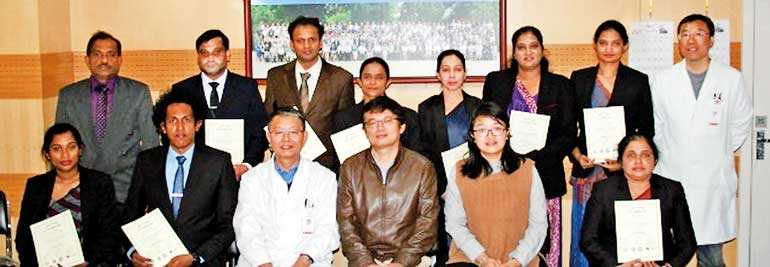Wednesday Feb 25, 2026
Wednesday Feb 25, 2026
Wednesday, 18 December 2019 00:54 - - {{hitsCtrl.values.hits}}


Ten Sri Lankan medical practitioners including three doctors and seven nurses from the Chronic Kidney Disease of Unknown Aetiology (CKDu) affected areas finished a 2-month training program at Peking University First Hospital (PUFH) in Beijing, one of the best hospitals in China.
The commencement ceremony of the Training Program was held on 12 December. For two months, the trainees got full time training in the PUFH haemodialysis centre, nephrology ward and peritoneal dialysis centre.
As a training program lasting for the third consecutive year, the training program was sponsored by the Chinese Academy of Sciences (CAS) in an attempt to help tackle the CKDu issue in Sri Lanka. The program has trained thirty medical practitioners for Sri Lanka up to now. CAS Research Centre for Eco-Environmental Sciences (RCEES) Deputy Director General Professor Min Yang, Peking University Institute of Nephrology Director Professor Minghui Zhao, and Jianting Su from the Beijing Centre for Diseases Prevention and Control (BJCDC) attended the ceremony. PUFH Associate Professor Liqiang Meng hosted the ceremony.
As the Principal Investigator of CKDu Causes Study Program supported by the Chinese Academy of Sciences (CAS), Prof. Min Yang stressed in his speech that there is a serious shortage of renal professionals in the CKDu affected areas in Sri Lanka. So RCEES arranged for the medical practitioners to accept systemic training from the PUFH Renal Division, which also deepens the cooperation and exchanges & friendship between China and Sri Lanka.
Prof. Minghui Zhao made a further introduction to the kidney disease education system of the PUFH Renal Division. The PUFH Renal Division, has become a recognised professional base for training academic backbones at home and abroad. Education in nephrology includes undergraduate, graduate, continuing education and specialist training. In recent years, the kidney disease education system of PUFH Renal Division has been internationalised gradually. In 2017, PUFH Renal Division became the regional training centre of the international society of nephrology, officially receiving visiting scholars from Asia, including 30 trainees of Sri Lankan medical practitioners in nephrology these years. Finally, he congratulated 10 trainees with the successful completion of the training program, and sincerely wished that more and more Sri Lankan medical practitioners in nephrology accept the learning and training in PUFH Renal Division. Exchanges and cooperation between Chinese and Sri Lankan medical practitioners will prospectively make contributions to the field of nephrology in the world.
Dr. Asela and Dr. Gajanayake addressed as representatives on behalf of the 10 trainees. They expressed their gratitude to the teachers and tutors from the Renal Division of PUFH and CAS for their comprehensive guidance, selfless teachings and remarkable inspirations that gifted them during the past two months.
The training program for doctors, nurses and technicians of Sri Lanka in the field of nephrology is sponsored by RCEES, CAS and commissioned by PUFH, and is financially supported from the CAS Program of China-Sri Lanka Joint Centre for Water Technology Research and Demonstration. In each 2 month training program, ten nephrological practitioners including doctors, nurses and technicians from the CKDu affected areas of Sri Lanka are selected by the Ministry of Health, Nutrition and Indigenous Medicine (MoH), Sri Lanka based on the MoU signed between the MoH and the CAS in 2016. All costs of these Sri Lankan nephrological trainees including return air ticket, accommodation and food are covered by the training program. Till now 30 nephrological practitioners have finished their training, and 20 of them are now using the new knowledge and technology to improve diagnosis and treatment of CKD and CKDu patients back in Sri Lanka.
For more information, please contact Prof. Yuansong Wei ([email protected]) or Dr. Ning Liu ([email protected])